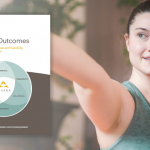PRESS RELEASE: Newly Promoted Chief Clinical Officer for Alsana®, Heather Russo, Details Plans to Invigorate Eating Disorder Treatment Programs with Renewed Emphasis on Compassion

Alsana’s CCO, an accomplished leader in the eating disorder treatment industry, brings fresh inspiration to the Adaptive Care Model® and bolsters shame-reduction practices with the integration of Compassion-Focused Therapy.
(Westlake Village, CA) March 13, 2022 – Heather Russo, LMFT, CEDS-S, Chief Clinical Officer (CCO) for Alsana, an eating recovery community, leads the Therapeutic Dimension of Alsana’s Adaptive Care Model® with a vision to leverage compassion in improving quality of care for individuals struggling with eating disorders and other co-occurring illnesses.
Before entering her current role in 2021, Russo served as Regional Executive Director for Alsana’s brick-and-mortar Residential and PHP/IOP programs in Southern California. During that time, Russo also oversaw Alsana’s virtual treatment offerings, which serve clients throughout the country. With more than a decade of prior professional eating disorder treatment experience, Russo is equipped with the values and insight to guide Alsana’s Therapeutic Dimension and Clinical Team with integrity and purpose.
A focus on compassion
The pandemic has exacerbated eating disorders symptoms, causing a significant spike in demand for eating recovery services nationwide. At the same time, individuals with co-occurring trauma-related disorders have endured a significant increase in symptoms’ severity and struggle to navigate recovery in ways that are truly unprecedented for this vulnerable population. These hard realities challenged Russo and her team to assess Alsana’s foundational clinical practices and identify opportunities for compassion-based enhancements.
Under Russo’s guidance, Alsana is strengthening its current therapeutic approach (which includes Cognitive Behavioral Therapy (CBT), Motivational Interviewing, and Dialectical Behavioral Therapy (DBT)) with the addition of Compassion Focused Therapy (CFT) – a method proven effective in shame reduction and trauma treatment. “Our clinical team’s primary area of focus in 2022 is the application of compassion in all we do,” Russo explained. “Our clients come to us with a self-compassion deficit. Without self-compassion, there can be no recovery.”
CFT promotes mental and emotional healing by helping clients replace internalized shame and self-criticism with acceptance and self-compassion. It also aids in the cultivation of mood management and relational skills and is proven effective not only in the treatment of eating disorders but in treating common comorbidities such as anxiety and depression. Substantial resources have been invested organization-wide to support its seamless integration. “Alsana’s mission to expand access to holistic, transdiagnostic, and evidence-based eating disorder treatment is supported by our commitment to data-driven care and a culture that cultivates compassion,” said Russo. “And, as a community of care providers, I believe we must strive to embody the compassion and self-compassion we want for our clients.”
Treatment Outcomes
The Therapeutic Dimension works in concert with the Medical, Nutritional, Relational, and Movement Dimensions of the Adaptive Care Model, the blueprint for Alsana’s holistic, evidence-based approach to eating disorder care. It seeks to facilitate healing in all areas of clients’ lives and continues to achieve industry-leading outcomes during the COVID-19 pandemic.
Alsana’s 2021 Treatment Outcomes Report, released earlier this week, details treatment outcomes and perception of care data for all Alsana’s virtual and in-person programs. According to this report, which is available to download here, 92 percent of 1,371 total Perception of Care survey respondents said they would recommend Alsana to others. It also reveals that Alsana clients who discharged in 2021 demonstrated statistically significant improvement in eating disorder symptoms from admission to discharge (p<.001) with an effect size of .501, as measured by the Eating Disorder Examination Questionnaire (EDE-Q).
“At Alsana, we treat people, not illnesses,” Russo said. “As a dynamic, evidence-based eating recovery community, it is crucial that we solicit continuous feedback from our clients regarding their perception of care and symptoms severity. This communication helps to ensure not only that treatment is effective but delivered with compassion and integrity. My hope for all clients is that they find a sense of peace in their relationships with food, with others, and with themselves and their bodies.”







